人教新课标高中英语必修二Unit 4 Wildlife protection导学案(2)
- 格式:doc
- 大小:108.57 KB
- 文档页数:7
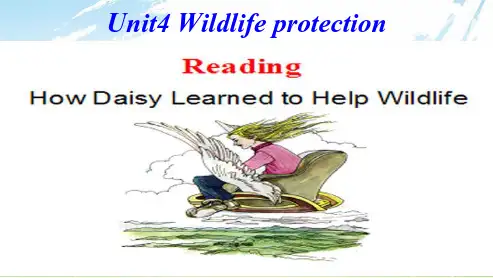
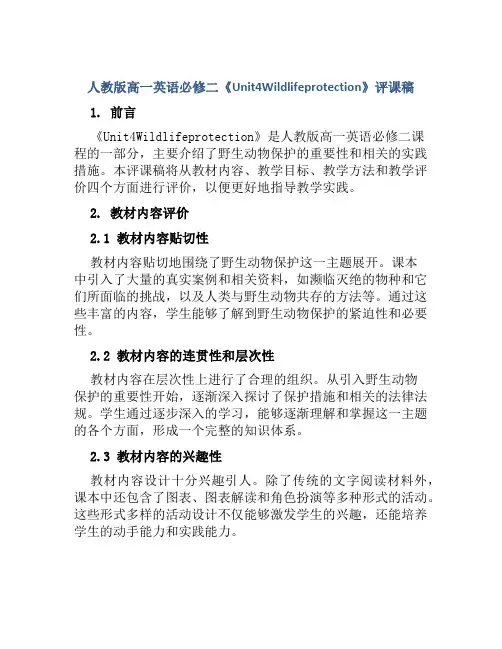
人教版高一英语必修二《Unit4Wildlifeprotection》评课稿1. 前言《Unit4Wildlifeprotection》是人教版高一英语必修二课程的一部分,主要介绍了野生动物保护的重要性和相关的实践措施。
本评课稿将从教材内容、教学目标、教学方法和教学评价四个方面进行评价,以便更好地指导教学实践。
2. 教材内容评价2.1 教材内容贴切性教材内容贴切地围绕了野生动物保护这一主题展开。
课本中引入了大量的真实案例和相关资料,如濒临灭绝的物种和它们所面临的挑战,以及人类与野生动物共存的方法等。
通过这些丰富的内容,学生能够了解到野生动物保护的紧迫性和必要性。
2.2 教材内容的连贯性和层次性教材内容在层次性上进行了合理的组织。
从引入野生动物保护的重要性开始,逐渐深入探讨了保护措施和相关的法律法规。
学生通过逐步深入的学习,能够逐渐理解和掌握这一主题的各个方面,形成一个完整的知识体系。
2.3 教材内容的兴趣性教材内容设计十分兴趣引人。
除了传统的文字阅读材料外,课本中还包含了图表、图表解读和角色扮演等多种形式的活动。
这些形式多样的活动设计不仅能够激发学生的兴趣,还能培养学生的动手能力和实践能力。
3. 教学目标评价3.1 知识目标根据教学大纲的要求,教学目标明确。
通过学习本单元的内容,学生应该能够掌握有关野生动物保护的相关知识,了解保护措施和相关的法律法规。
3.2 能力目标教学目标中强调了培养学生的口头表达能力、独立思考能力和解决问题的能力。
通过课堂上的互动和小组活动,学生能够得到锻炼,并在实践中不断提升这些能力。
3.3 情感目标教学目标中也涵盖了培养学生的环保意识和责任感。
通过学习野生动物保护的案例和相关知识,学生能够更好地理解人类与自然环境的关系,并形成积极的环保态度。
4. 教学方法评价4.1 多媒体教学法多媒体教学法在本单元教学中得到了广泛运用。
通过使用图片、音频和视频等多种媒体形式,能够更直观地展示野生动物保护的案例和实际情况,提高学生的学习兴趣和理解能力。
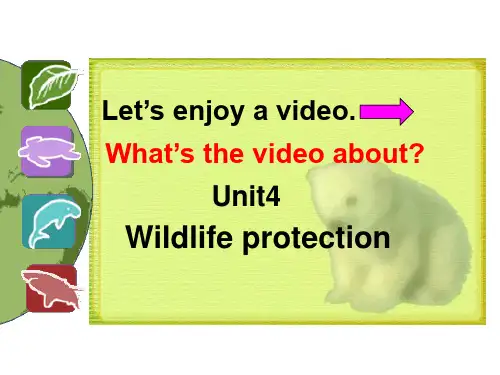
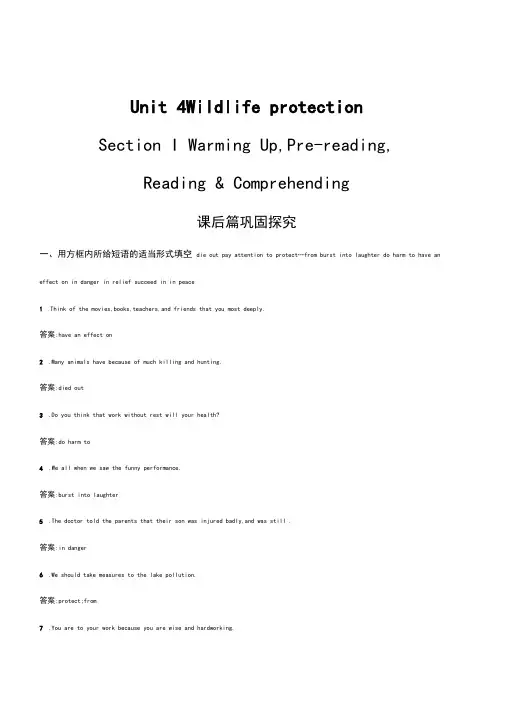
Unit 4Wildlife protectionSection I Warming Up,Pre-reading,Reading & Comprehending课后篇巩固探究一、用方框内所给短语的适当形式填空die out pay attention to protect…from burst into laughter do harm to have an effect on in danger in relief succeed in in peace1.Think of the movies,books,teachers,and friends that you most deeply.答案:have an effect on2.Many animals have because of much killing and hunting.答案:died out3.Do you think that work without rest will your health?答案:do harm to4.We all when we saw the funny performance.答案:burst into laughter5.The doctor told the parents that their son was injured badly,and was still .答案:in danger6.We should take measures to the lake pollution.答案:protect;from7.You are to your work because you are wise and hardworking.答案:succeed in8.People won' t you when they still have a lot of ideas of their own crying forexpression.答案:pay attention to9.Not until we succeed in letting wildlife live in peace,can we smile .答案:in relief10.Don' t bother me;just let me stay here.答案:in peace二、单句语法填空I.Nature deserves our(protect) because we are part of it.答案:protection1.1t never occurred to him that his carelessness could do such great(harm) to himself.答案:harm3.He prefers to live a (peace) life in the countryside.答案:peaceful4.Do you know the task is very (danger)?答案:dangerous5.(2017 江苏)In southern Spain the sudden(increase) of greenhouses (which reflect light back to space) has changed the warming trend locally,and actually cooled the region.答案:increase6.When we heard the joke,all of us burst out (laugh).答案:laughing7.His question failed to get (respond)from his students.答案:response8. — Don' t worry,Mom.The doctor said it was only the flu.—What relief!I ' ll tell Dad there ' s nothing serious.答案:a9.They were(succeed) in achieving both aims.答案:successful10.(2017 江苏)Far from charging consumers high prices,many of these services are free (users pay, effect,by handing over yet more data).答案:in11.(2017 全国出)He posted his offer on a social networking website,and received thousands of emails,(include) thirty from actual Elizabeth Gallaghers with the right passports.答案:including12.The films which (affect)us many years ago still have effect on our children.答案:affected;an13.Great attention must(pay)to developing education,especially in the countryside.答案:be paid14.In order to make money,some farmers often hunted some (endanger) species and killed them without mercy.答案:endangered15.I would greatly appreciate if you would send me the application forms as soon as possible.答案:it三、单句改错1.Finally,I wish this year ' s English speech competition great success.答案:在great前加a1.1 would greatly appreciate if you would give me a hand.答案:在if 前加it3 .We should pay more attention the needs of our elders.答案:在the 前加to4 .They are likely to respond positively for the president ' s request for aid.答案:第一个for 改为to5.In our relief,he was not injured in the car accident.答案:把第一个In 改为To四、课文精彩回顾Daisy had always longed to help 1.species of wildlife.One day she was taken to a 2.land where animals could be found.When Daisy arrived in Zimbabwe,an elephant asked her if she cameto take a photo.Daisy 3.into laughter on hearing its words.The elephant told her that they used to be.At that time the government decided to take measures to protect the wildanimals,which showed the 5.of wildlife protection.When Daisy was in a thick rainforest,amosquitoes,explaining that the millipede insect 8. mosquitoes.He said people should pay more 10.to the rainforest wherehe lived.Only in this way could people live in peace with wildlife.答案:1.endangered 2.distant 3.burst 4.mercy5.importance6.rubbed7.protecting8.contained9.affected 10.attention五、阅读理解hunted without 4. monkey watched them as he 6. himself.He told Daisy that he was 7.himself from a powerful drug which 9.(棣心宣卷思维品质)Have you ever wondered what wild animals do when no one is watching?Scientists have been able to record the private" momentsof wildlife with leading-edge technology.Low-cost,dependable and small modern cameras are a big help.Cameras placed in hard-to-reach places have taken videos of everything from small desert cats to larger snowloving felines(猫科)in the northern Rocky Mountains.These cameras are important tools to learn new information on wildlife.Some videos help scientists see the effects of climate change.For example,the desert animal javelina and the treeloving coatimundi(长鼻浣熊)have been caught on cameras north of their normal home.This could mean global warming is enlarging their living area northward.Researchers use cameras along with global positioning systems,or GPS.They attach GPS devices(设备)to mule deer and antelope (羚羊)in and around Yellowstone National Park.Then they can record their movements,or migrations(迁移).These cameras can be left in very rural(荒里予的)areas for days,weeks or even months.They can provide information on how many animals are moving over a given period of time.Rural video can show details about animal behavior,such as the calls made by migrating mule deer.Also,some cameras record animal life,showing everything from bison in Saskatchewan,Canada,to the underwater weed forest off California ' s Channel Islands.However,rural cameras have their problems too.Animals such as wolverines and bears sometimes attack them.Scientists do not know if the attacks are the results of anger or interest.Also,the devices have become popular tools to help hunters look for animals.Some people argue that it is unfair to use the cameras that way.Even with such problems,rural cameras are clearly an important scientific tool in researching wild animals.1.Which of the following helps scientists know about climate change?A.How active animals are.B.Where animals go.C.What animals eat.D.When animals move.答案:B解析:细节理解题。
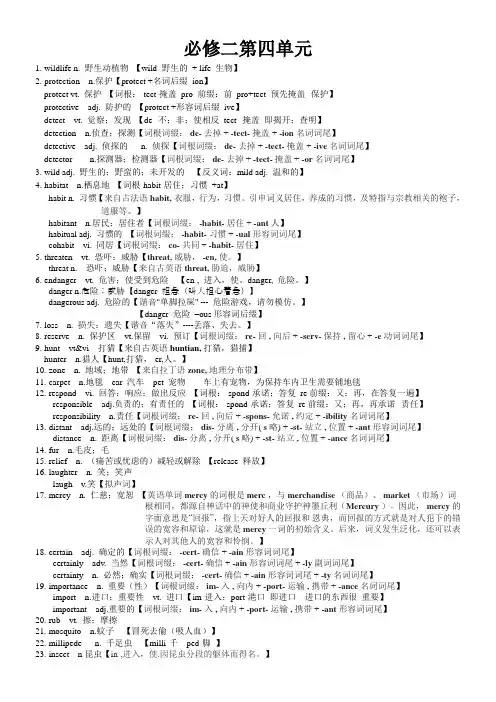
必修二第四单元1.wildlife n. 野生动植物【wild 野生的+ life 生物】2.protection n.保护【protect +名词后缀ion】protect vt. 保护【词根:-tect-掩盖pro 前缀:前pro+tect 预先掩盖--保护】protective adj. 防护的【protect +形容词后缀ive】detect vt. 觉察;发现【de--不;非;使相反tect--掩盖即揭开;查明】detection n.侦查;探测【词根词缀:de-去掉 + -tect-掩盖 + -ion名词词尾】detective adj. 侦探的n. 侦探【词根词缀:de-去掉 + -tect-掩盖 + -ive名词词尾】detector n.探测器;检测器【词根词缀:de-去掉 + -tect-掩盖 + -or名词词尾】3.wild adj. 野生的;野蛮的;未开发的【反义词:mild adj. 温和的】4.habitat n.栖息地【词根-habit-居住;习惯+at】habit n. 习惯【来自古法语habit,衣服,行为,习惯。
引申词义居住,养成的习惯,及特指与宗教相关的袍子,道服等。
】habitant n.居民;居住者【词根词缀:-habit-居住 + -ant人】habitual adj. 习惯的【词根词缀:-habit-习惯 + -ual形容词词尾】cohabit vi. 同居【词根词缀:co-共同 + -habit-居住】5.threaten vt. 恐吓;威胁【threat,威胁,-en,使。
】threat n. 恐吓;威胁【来自古英语threat,胁迫,威胁】6.endanger vt. 危害;使受到危险【en-, 进入,使。
danger, 危险。
】danger n.危险;威胁【danger 担急(叫人担心着急)】dangerous adj. 危险的【谐音"单脚拉屎" --- 危险游戏,请勿模仿。
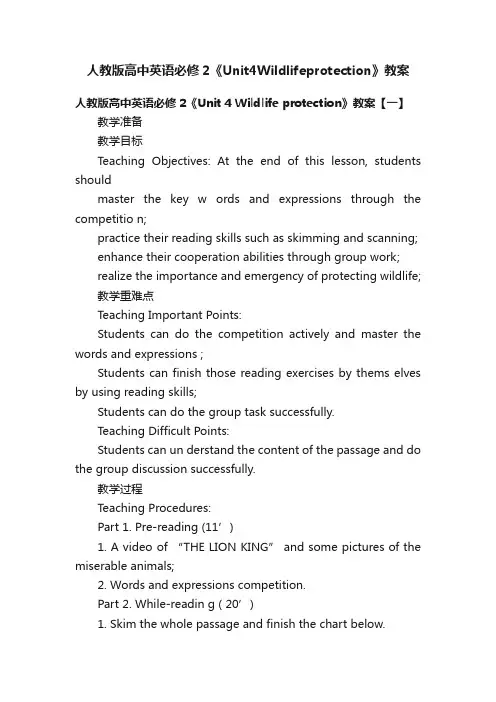
人教版高中英语必修2《Unit4Wildlifeprotection》教案人教版高中英语必修2《Unit 4 Wildlife protection》教案【一】教学准备教学目标Teaching Objectives: At the end of this lesson, students shouldmaster the key w ords and expressions through the competitio n;practice their reading skills such as skimming and scanning;enhance their cooperation abilities through group work;realize the importance and emergency of protecting wildlife;教学重难点Teaching Important Points:Students can do the competition actively and master the words and expressions ;Students can finish those reading exercises by thems elves by using reading skills;Students can do the group task successfully.Teaching Difficult Points:Students can un derstand the content of the passage and do the group discussion successfully.教学过程Teaching Procedures:Part 1. Pre-reading (11’)1. A video of “THE LION KING” and some pictures of the miserable animals;2. Words and expressions competition.Part 2. While-readin g ( 20’)1. Skim the whole passage and finish the chart below.2. Read the Paragraph 1 and find out the answers to the following questions.1). How did the antelope feel?2). Why are people hunting and killing the Tibetan antelopes?3. Read paragraph 2 and choose the best answer according to the text.1). Why is the number of elephants increa sing in Zimbabwe?A. Because more elephants have come to Zimbabwe.B. Because farmers are happy and no longer kill them;C, Because those elephants don’t destroy farms any more.2). How does the government of Zimbabwe help protec t wild animals?A. It allowed tourists to hunt a small number of animals if they paid the farmers;B. It forced farmers to protect the animals.C. It put m ore wild animals into Zimbabwe.4. Read parag raph 3 and fill in the blanks.When the carpet and Daisy came to ___ ___ ______, they saw a _______ rubbing itself with a millipede _______, which can ______ mosquitoes because it ______ a powerful drug. The money told Daisy to pay more ________to the rainforest and _____ how the animals live t ogether. No forest, no animals, no _____.5. True or False statements.1. Daisy saw many antelopes in Tibet.2. Daisy’s sweater was made of sheep wool.3. The elephant used to be well protected in Zimbabwe.4. In Zimbabwe, tourists love to see the elephants.5. The farmers in Zimbabwe get nothing from the elephants now.6. This is a real story in Daisy’s life.Part 3. Post-reading ( 8’)1.Ask “Daisy” to talk about her feeling;2. Discussion: What should we do to protect wildlife?3. See a short video of Jackie Chan.Part 4. Summary and Wri ting ( 1’)Write a short passage based on the discussion.课后习题Please write a letter to WWF and provide some suggestions on how to protect wildlife.人教版高中英语必修2《Unit 4 Wildlife protection》教案【二】教学准备教学目标Improve students’ ability of extensive reading.Improve students’ a skills of listening.教学重难点1. Teaching important points:A. Improve students’ ability of extensive reading.B. Improve students’ a skills of listening.2. Teaching difficult points:A. How to finish the task in limited time.B. How to get the accurate information while listening.教学工具课件教学过程Step 1. GreetingStep 2. Daily reportStep 3. RevisionCheck the answers to the exercises done yesterday.Step 4. Extensive reading1. Ask students two questions before listening to the tape,and then listen to the recording of the text:A. When did dinosaurs live on the earth?B. Why did they die out?2. Explain the following language points:① long before 很久以前before long 不久之后Dinosaurs do live on the earth long before.Before long dinosaurs die out from the earth.② on the earth- in the worldon earth 究竟What on earth do you want?Step 5. Listening1. Explain the following difficult words to the students before listening:① o nce upon a time 曾经;很久以前② curious adj. 好奇的③ wing n. 翅膀④ trap n. 陷阱⑤ spear n. 矛2. Listen to the recording of Dodo’s Story.3. Finish Ex 1 on p30.4. Check the answers (C D B C)5. Listen to the tape again and finish ex2 on P30Step 6 Homework1. Finish Ex. 21-55 on English Weekly 15th2. Review the language points in this unit.课后小结学了这节课,你有什么收获?课后习题完成课后习题。
![人教版高一英语 必修二 Unit4 Wildlife protection 单词[有音标]](https://uimg.taocdn.com/71a3c2b2960590c69ec37698.webp)
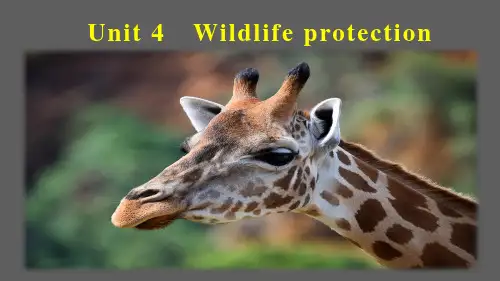
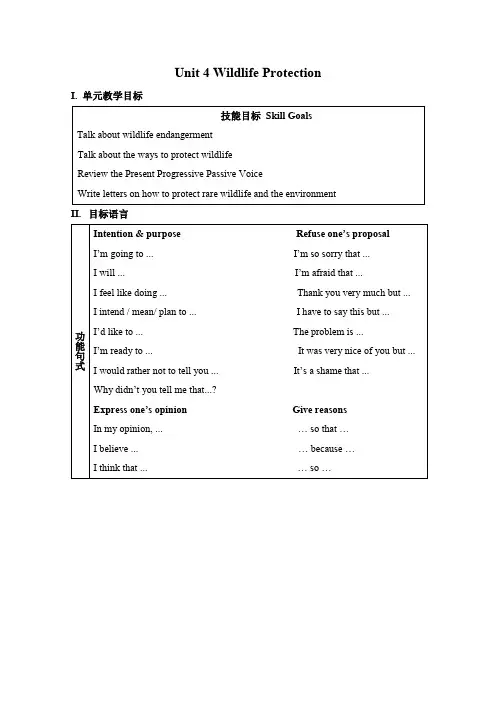
Unit 4 Wildlife Protection I. 单元教学目标II. 目标语言II. 教材分析与教材重组1. 教材分析本单元以保护动物为话题,旨在通过本单元的学习使学生了解很多动物已经灭绝或濒临灭绝,从而认识到保护动物的重要性和必要性;通过探讨保护动物的措施和建议,引导学生发表自己的见解和看法;通过进一步讨论提出有效的保护措施,唤起学生保护动植物、维护生态平衡、保护我们家园的责任感。
并能写信表达自己保护动物的方法与建议,力求正确表达自己的意图并解释原因,并能正确使用被动语态的现在进行时。
1.1 Warming Up首先帮助学生明确保护野生动物的原因以及方向。
旨在通过图片和表格引导学生讨论当今我国珍稀动物的现状。
以panda、Milu Deer、South China Tiger 为例,通过对这些珍惜动物所面临的问题、在中国的栖息地以及采取措施其后对比所做的报告,学生能够用已有的知识和经验讨论在中国处于保护状态下的濒临灭绝动物。
从而有效地引导学生关注本单元话题,关注动物生存现状。
1.2 Pre-reading是Reading的热身活动。
通过回答两个问题引导学生讨论自己所知道的濒临灭绝的动物并思考灭亡的原因。
同时要求学生通过阅读文中的图片和标题来猜测文章的内容。
1.3 Reading是一篇童话故事,讲述Daisy 乘坐飞毯跨越时空,在不同个国度、不同地区与生存状态不尽相同的和藏羚羊、大象、猴子对话的神奇经历,展示了Daisy逐渐认识保护动物重要性以及学习如何保护动物的经历。
动物们讲述了各自的处境,唤起了Daisy对动物的热爱以及保护动物的责任心。
从而号召人们热爱动物,保护动物,从我做起。
1.4 Comprehending考察学生对阅读内容的进一步理解与对所学知识的综合运用、迁移。
练习1要求学生根据阅读文的内容回答问题。
这四个问题设计到濒临物种生存现状,保护这些物种所取得成效的措施、保护动物栖息地的重要性以及决定保护成果能够的必要措施。
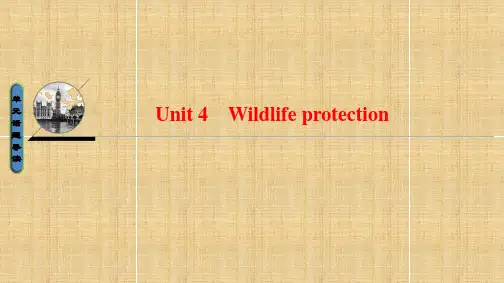
高一英语导学案必修二:Unit 4 Wildlife Protection编写:Period 1: Warming up and Reading comprehensionⅠWarming up1.What are the animals? Why are they endangered?2.Why are the animals being hunted?ⅡFast reading1.Main Idea:Daisy took ___________ to travel and talked with ____________, which made her know _____________ of the wildlife protection.Tips for summing up the main idea of a storyWho?What happened?What’s the meaning of the story?2.True or false1). Daisy saw many antelopes in Tibet.2). Daisy’s sweater was made of sheep wool.3). The antelopes were an endangered species.4). The elephant used to be well protected in Zimbabwe.5). In Zimbabwe, tourists love to see the elephants.6). The farmers in Zimbabwe get nothing from the elephants now.7). This is a real story in Daisy’s life.ⅢCareful reading1.Fill in the table3.Read the passage carefully to get the detailed information and then choose the best answer.1) Paragraph 1 suggests that ( )A. the number of the antelope in Tibet is getting much smaller nowB. Daisy would like to see the antelopes very muchC. the antelopes have all been killed for the wool and none were leftD. the antelopes have moved from Tibet to some other places2) From Paragraph 2 we can refer that ( )A. farmers in Zimbabwe once made a living by huntingB. farmers are not satisfied with the governmentC. the living conditions of elephants in Zimbabwe have been improvedD. animals in Zimbabwe find it interesting to take photos with tourists3) Which of the following is not true according to the passage? ( )A. Daisy knew little about wildlife protection before the visit.B. The endangered animals will disappear in the near future/C. WWF is an organization whose duty is to protect wildlife.D. Animals are being threatened in different ways.4) Which is the most probable reason why the monkeys in the rain forest are dyingout?( )A. There are too many tourists.B. They are being hunted and killed.C. Their habitats are being destroyed.D. There is not enough food for them.5) From the end of the story we can conclude that ( ).A. WWF will help Daisy to make the powerful drugB. WWF has done little to protect wildlifeC. people will stop killing animals with the help of WWFD. Daisy will continue to help protect wildlife by working with WWF课文完形:根据课文内容完成下面语法填空,注意单词拼写和词语用法:Daisy desired to help 1 (endanger) species of wildlife because a large numberof animals are dying 2 . One day, a flying carpet took her to a 3 (遥远) land, 4 she could find antelopes 5 gave fur to make sweaters. Then she met an elephant in Zimbabwe and was told that elephants used to be hunted without 6 . But now people know the 7 (重要) of wildlife 8 (protect).Period 2:Language points in Warming up语言点:1.decrease原文再现:If their habitat is threatened or they cannot find enough food, their numbers may decrease.1) Population growth is decreasing by 1.4% each year.2) The number of independent firms decreased from 198 to 96。
3) He decreased the speed of his car.词性词意4) a decrease in the number of young people out of work...5) a decrease of 40 per cent.词性词意,其后常接介词拓展 increase vi.&vt. 增加;增长;增强;n.增加;增加的数量decrease 减少到decrease 减少了on the decrease/increase即学即练①这些措施将有助于降低生产成本。
will help the cost of production.②人口出生率正在下降。
The birthrate is .2.threaten原文再现:If their habitat is threatened or they cannot find enough food, their numbers may decrease.1)The robber threatened me with a gun.He threatened to make the photo public.threaten +n.+ +n.以...恐吓...threaten 恐吓说要...2)A typhoon was threatening.threat n. 威胁 threatening adj. 恐吓的,威胁的3. die out原文再现:As a result these endangered animals may even die out.1)Many species will soon die out if we don’t take action.2) Many old customs are dying out.3) The fire died out in the end.4. loss原文再现:loss of bamboo1)Have you reported the loss of the technical papers to the police?2) His unfortunate death was a great loss to the company.3)That company suffered heavy loss in business last year.be at a loss4)I was at a complete loss as to find the money in time.5)She was at a loss for an answer.5. reserven: 1) nature reserve 自然保护区 2) We have large reserve of oil.vt: 1) You’d better reserve some money for future need . 2) I’d like to reserve a table for two.6. hunt原文再现:Too much hunting in the 1950s1)Wolves hunt in packs.2)He likes hunting very much.3)We’ve been hunting for the lost boy all over . 4)It was an exciting hunt, but the fox escaped. 5)He is on the hunt for a better job. 词性 .词意 常用结构:hunter a hunting dog a hunting ground 狩猎场 go 去打猎 试图找到(某人/物)7. in peace原文再现:About 30-40 remain after being left in peace with no hunting 1)He lives in peace and content. 2)He died in peace.in peaceat peace 休战,和睦相处。